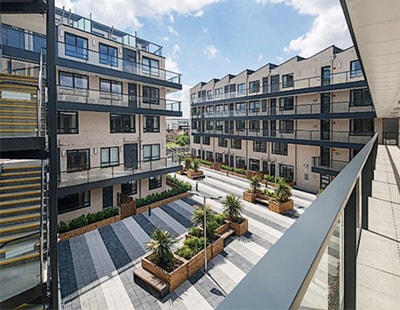However, the sector then gained serious momentum between 2018 and 2019, with new completions jumping by 54% on an annual basis. To put this momentum into perspective, Ascend says new build completions excluding BTR increased by just 6% during the same period.
Completions fell again in 2020 as a result of Covid, with the pandemic causing havoc for the market for a time. Unsurprisingly, just 10,158 new BTR completions reached the market last year, a year-on-year decline of 20%.
Despite this, it’s been estimated that this decline in new completions has been more pronounced across the rest of the new-build sector, with a 28% fall in completions for non-BTR new-builds. Ascend says this once again highlights the strength of the BTR sector in the current market.
Aside from the stutter in new completion levels last year – at least in part down to the many issues the pandemic caused with construction and supply lines – the overall size of the BTR has continued to increase.
Ascend found that, between 2017 and 2018, the cumulative total number of BTR completions saw the sector grow by 36%, before growing by a further 41% between 2018 and 2019.
Despite the decline in new completions during 2020, the stock that has reached the market means the BTR market has still grown by a further 23% cumulatively.
Based on the best available data for the sector, Ascend – a Manchester-based BTR specialist which manages a number of developments across the North West and Midlands – has forecast that a further 73,535 BTR completions should reach the market by the start of 2025.
Alongside the existing 53,750 BTR completions already within the market, this forecast could see total BTR stock hit an estimated 127,285 completions in four years’ time.
“The BTR sector is an increasingly important part of the market, and we see that trend continuing over the next five years,” Ged McPartlin, managing director of Ascend Properties, said.
“There’s a growing recognition that owning property may not be the norm in the future, as is already the case in numerous other European countries. In the UK’s most expensive regions such as London, many already rent for far longer than we’ve seen traditionally and while we remain a nation of aspirational homeowners, not everyone is as focused on realising this aspiration.”
As a result, he says it’s important residents are able to reside in high-quality properties fit for their needs. He argues BTR fits this gap perfectly and insists it’s no surprise that the sector has seen an impressive level of growth in just a few short years, ‘as well as a notable level of investment’.
“We’ve seen a number of big housebuilders and institutional investors shift focus towards the BTR sector in recent years and it has become an integral part of forward planning where stock delivery is concerned,” McPartlin added.
“Those yet to realise this are likely to be playing catch-up as the sector continues to build momentum in the coming years.”
Ascend's forecast on BTR completions by Q1 of 2025 is based on historic BTR sector data and using an Exponential Smoothing Forecasting model (ESF), including interpolation, accounting for seasonality, and based on a 95% confidence interval.
You can see the stats in the table below.
|
Year
|
Build to Rent Completions
|
Annual Change (%)
|
New Build Completions Exc B2R
|
Annual
Change (%)
|
|
2017
|
8,174
|
-
|
185,511
|
-
|
|
2018
|
8,239
|
1%
|
190,739
|
3%
|
|
2019
|
12,669
|
54%
|
201,513
|
6%
|
|
2020
|
10,158
|
-20%
|
144,522*
|
-28%
|
|
*estimate based on per quarter averages to date (England and NI), with average annual % changes from these applied where no 2020 data was available (Wales and Scotland)
|
|
|
|
|
|
|
|
Year
|
Cumulative B2R Completions
|
Annual
Change (%)
|
|
|
|
2017 (Q4)
|
22,684
|
|
|
|
|
2018 (Q4)
|
30,923
|
36%
|
|
|
|
2019 (Q4)
|
43,592
|
41%
|
|
|
|
2020 (Q4)
|
53,750
|
23%
|
|
|
|
|
|
|
|
|
|
Data Description
|
Data Point
|
|
|
|
|
Total B2R Completions to Date
|
53,750
|
|
|
|
|
Forecasted Completions 2021 (Q1) to 2025 (Q1)
|
73,535
|
|
|
|
|
Total Estimated B2R Completions by 2025 (Q1)
|
127,285
|
|
|
|
(Table provided by Ascend Properties)
New scheme for The Collective in Battersea
Meanwhile, in the co-living sector – the niche marketplace which shares many similarities with BTR, to the point where it’s difficult to pinpoint the differences – the market’s biggest brand name is growing its portfolio further with a new 260-plus room scheme in Battersea.
The Collective, the property and asset manager of DTZ Investors’ co-living fund, will build and operate the development on Chatfield Road, in the London Borough of Wandsworth.
Once completed, it will be the third asset in the fund following the forward-funding of The Collective Harrow (announced in October 2019) and The Collective Earlsfield (announced in October last year).
The Collective Battersea says it will provide 35% affordable housing, available at discount market rent for people with starting salaries of £22,000 per year.
The DTZ Investors ‘Co-Living Fund I’, known as COLIV, was launched in October 2019 and is the world’s first unlisted collective investment vehicle for professional investors investing in large-scale, purpose-built co-living buildings in London.
The fund was set up by DTZ Investors in partnership with The Collective, seen as one of the globe’s co-living pioneers. It was responsible for the opening of the UK’s first co-living scheme at Old Oak Common and has since added another scheme in Canary Wharf.
In December 2019, a new scheme in Stratford – to transform an unused commercial site on the high street – was given the go-ahead, although little has been heard about its progress since. The company also has a scheme in New York.
Despite its brand recognition – it’s comfortably the best-known and biggest co-living operator in the UK – The Collective hasn’t been without criticism for its perceived unaffordability, tiny rooms and cynical corporate feel.
The COLIV collaboration, though, was based on a shared vision and belief in creating co-living places ‘which deliver a meaningful and tangible social and environmental impact’.
Chris Cooper, chief executive officer at DTZ Investors, said of the latest forward-funding deal: “Co-living as a sector has been remarkably resilient during the pandemic. The desire for human connection remains very strong and demand is highest in buildings that combine high-quality living spaces with a wide range of communal amenities.”
He added: “The acquisition of The Collective Battersea marks another vital step toward fulfilling the investment strategy of our dedicated co-living investment vehicle, which now has a completed GDV of over £200 million.”
“Once fully capitalised, the fund’s portfolio of co-living buildings in prime locations across the capital will be home to 3,500 people. As well as providing shared spaces for people to spend time with one another and helping to tackle the loneliness problem, we are giving back through The Collective and the fund’s Community Investment Programme to support local social, environmental and charitable projects.”
Reza Merchant, chief executive officer and founder of The Collective, said: “We’re pleased to close this deal with DTZ Investors and the COLIV fund – a further demonstration of institutional demand for our vertically integrated co-living model. We strongly believe consumer demand for our product to be counter-cyclical, and we’re pleased to see this validated in the current challenging economic climate.”
He insisted The Collective had seen continued robust enquiries and bookings across its portfolio throughout the pandemic, apparently driven by consumers’ increasing prioritisation of ‘value for money, convenience and human connection’ in their choice of home.
“The Collective Battersea will be one of a number of our projects to go into construction in central London in 2021, all offering one-of-a-kind shared spaces, an inspiring events programme, and a vibrant community to call home,” Merchant added.
“Our mission is to build a global network of spaces that enable people to lead more fulfilling lives and positively impact the neighbourhoods they’re part of, and this highly sustainable development with subsidised rents for local people is another big step on our journey.”
The fund says the new affordable homes will be marketed exclusively to local people and key workers first, with nomination rights for the council reserved for subsequent occupants.
The Collective Battersea is set to include a gym and studio spaces, to help facilitate events based around health and wellbeing, and can be utilised by the wider community, while there are also roof terraces and outdoor spaces providing immediate access to the River Thames.
Ultimately, the fund – the world’s first institutional co-living investment vehicle dedicated solely to the co-living sector - aims to raise total equity commitments of up to £650 million and to acquire, or forward fund, between six and ten co-living assets in London, with a target gross asset value of £1 billion across the life of the fund.
In July 2020, DTZ Investors announced that Merseyside Pension Fund had joined other investors, including the Strathclyde Pension Fund, in investing.










.png)









Join the conversation
Be the first to comment (please use the comment box below)
Please login to comment